| |
| |
 |
|
Speaking my Soul: Race, Life and Language
Routledge.com description:
Speaking My Soul is the honest story of linguist John R. Rickford’s life from his early years as the youngest of ten children in Guyana to his status as Emeritus Professor of Linguistics at Stanford, of the transformation of his identity from colored or mixed race in Guyana to black in the USA, and of his work championing Black Talk and its speakers.
This is an inspiring story of the personal and professional growth of a black scholar, from his life as an immigrant to the USA to a world-renowned expert who has made a leading contribution to the study of African American life, history, language and culture. In this engaging memoir, Rickford recalls landmark events for his racial identity like being elected president of the Black Student Association at the University of California, Santa Cruz; learning from black expeditions to the South Carolina Sea Islands, Jamaica, Belize and Ghana; and meeting or interviewing civil rights icons like Huey P. Newton, Rosa Parks and South African Dennis Brutus. He worked with Rachel Jeantel, Trayvon Martin’s good friend, and key witness in the trial of George Zimmerman for his murder—Zimmerman’s exoneration sparked the Black Lives Matter movement.
With a foreword by poet John Agard, this is the account of a former Director of African and African American Studies whose work has increased our understanding of the richness of African American language and our awareness of the education and criminal justice challenges facing African Americans. It is key reading for students and faculty in linguistics, mixed race studies, African American studies and social justice.
|
|
|
| |
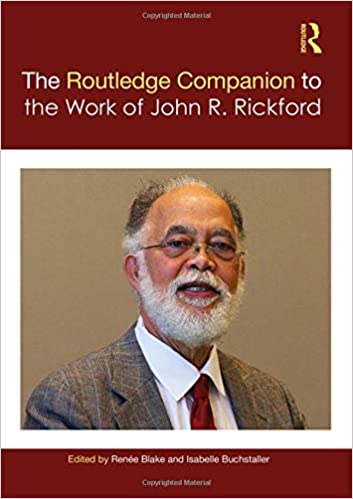 |
|
The Routledge Companion to the Work of John R. Rickford
Amazon.com description:
This comprehensive collection is the first full book-length volume to bring together writing focused around and inspired by the work of John Rickford and his role in sociolinguistic research over the last four decades. Featuring contributions from more than 40 leading scholars in the field, the volume integrates both historical and current perspectives on key topics in Rickford’s body of work at the intersection of language and society, highlighting the influence of his work from diverse fields such as sociolinguistics, stylistics, creole studies, and language and education. (more at Amazon...)
|
|
|
| |
| |
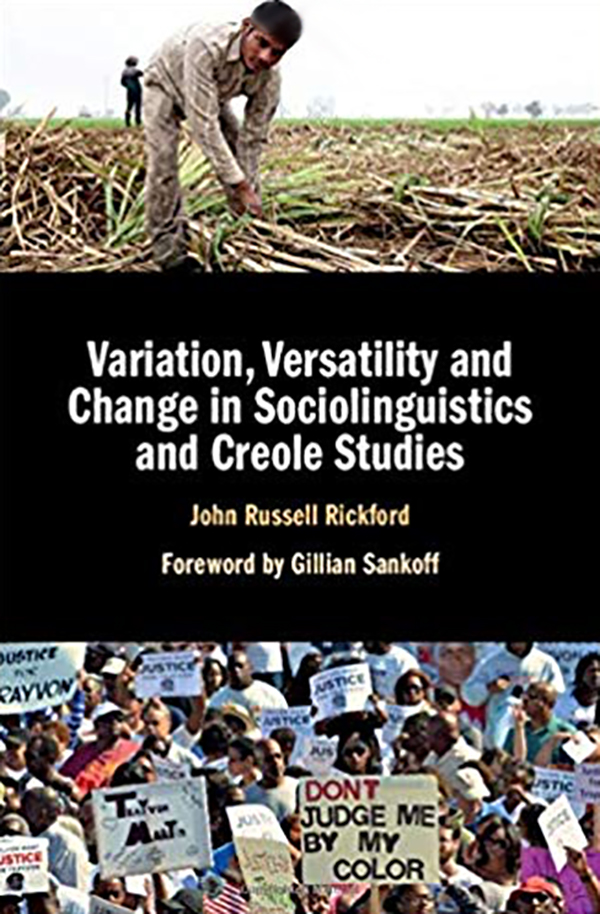 |
|
Variation, Versatility and Change in Sociolinguistics and Creole Studies
Amazon.com description:
By the award-winning former president of the Linguistic Society of America, this collection of some of John Russell Rickford's pioneering works shows how linguists in sociolinguistics and creole studies can benefit from utilizing data, theories and methods from each other, as they more frequently did in the 1960s and 1970s, when both subfields, in their modern forms at least, were getting started. The volume addresses fundamental sociolinguistic topics such as social class, style, fieldwork, speech community, sociolinguistic competence and language attitudes with data from Guyanese and other Caribbean creoles. Recurrent concepts are also considered including language versatility, variation and change, vernacular use, school success and criminal justice in African America and the Caribbean, using models, case studies and methodologies from sociolinguistics. Theoretical and applied scholars, students apprehensive about sociolinguistic fieldwork, and those considering dynamic methods like implicational scaling about which little is written in linguistics textbooks, will find this volume invaluable. Includes a Foreword by Gillian Sankoff.
|
|
|
| |
| |
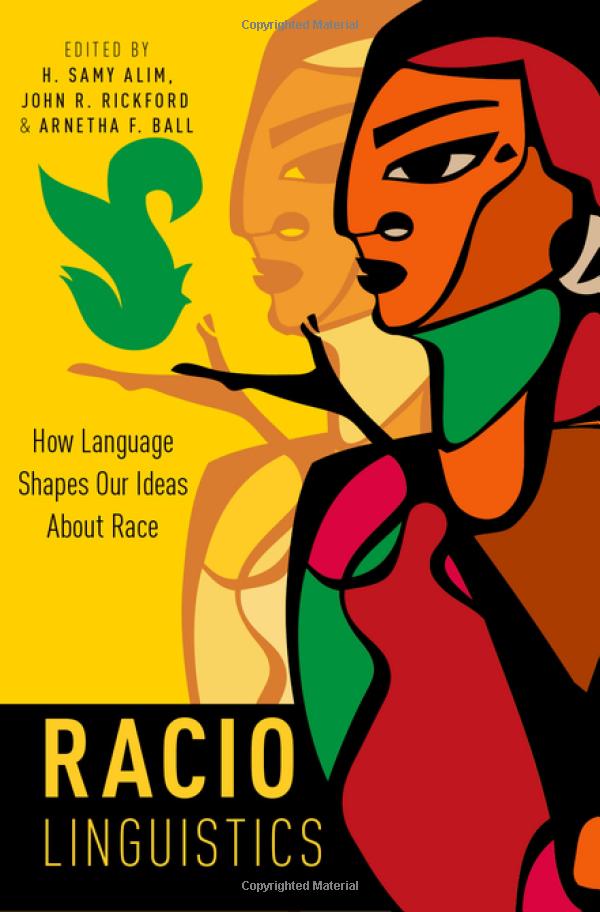 |
|
Raciolinguistics: How Language Shapes Our Ideas About Race (with H. Samy Alim, and Arnetha F. Ball)
Amazon.com description:
Raciolinguistics reveals the central role that language plays in shaping our ideas about race and vice versa. The book brings together a team of leading scholars-working both within and beyond the United States-to share powerful, much-needed research that helps us understand the increasingly vexed relationships between race, ethnicity, and language in our rapidly changing world. Combining the innovative, cutting-edge approaches of race and ethnic studies with fine-grained linguistic analyses, authors cover a wide range of topics including the struggle over the very term "African American," the racialized language education debates within the increasing number of "majority-minority" immigrant communities in the U.S., the dangers of multicultural education in a Europe that is struggling to meet the needs of new migrants, and the sociopolitical and cultural meanings of linguistic styles used in Brazilian favelas, South African townships, Mexican and Puerto Rican barrios in Chicago, and Korean American "cram schools" in New York City, among other sites.
Taking into account rapidly changing demographics in the U.S and shifting cultural and media trends across the globe--from Hip Hop cultures, to transnational Mexican popular and street cultures, to Israeli reality TV, to new immigration trends across Africa and Europe--Raciolinguistics shapes the future of scholarship on race, ethnicity, and language. By taking a comparative look across a diverse range of language and literacy contexts, the volume seeks not only to set the research agenda in this burgeoning area of study, but also to help resolve pressing educational and political problems in some of the most contested raciolinguistic contexts in the world.
|
|
|
| |
| |
 |
|
African American, Creole, and Other English Vernaculars in Education: A Bibliographical Resource (with Julie Sweetland, Angela Rickford, and Thomas Grano)
Amazon.com description:
More than 50 years of scholarly attention to the intersection of language and education have resulted in a rich body of literature on the role of vernacular language varieties in the classroom. This field of work can be bewildering in its size and variety, drawing as it does on the diverse methods, theories, and research paradigms of fields such as sociolinguistics, applied linguistics, psychology, and education. Compiling many, if not most, of the publications from the past half century that deal with this critical topic, this volume includes more than 1600 references (books, articles in journals or books, and web-accessible dissertations and other works) on education in relation to African American Vernacular English [AAVE], English-based pidgins and creoles, Latina/o English, Native American English, and other English vernaculars such as Appalachian English in the US and Aboriginal English in Australia, with accompanying abstracts for approximately a third of them. This comprehensive bibliography provides a tool useful for those interested in the complex issue of how knowledge about language variation can be used to more effectively teach students who speak a nonstandard or stigmatized language variety. (more...)
|
|
|
| |
| |
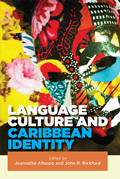 |
|
Language, Culture and Caribbean Identity
This timely and insightful publication, thought-provoking and highly educational, is dedicated to the memory of outstanding Caribbean linguist, Richard Allsopp. The contributors, many of them leading authorities on language variation in the Caribbean, explore various aspects of language, culture and identity in the region, focusing on themes that engaged Allsopp in his lifetime: Creole linguistics, Caribbean lexicography, language in folklore and religion, literature, music and dance, and language issues in Caribbean schools.
- University of the West Indies Press
"This landmark tribute to the Caribbeans pioneering lexicographer brings together contributions that span the encyclopaedic interests that Richard Allsopp would have pursued in his journey through Caribbean English usage. The volume is at once provocative and informative an excellent read for both the specialist linguistic scholar and the curious layman."
- Lawrence D. Carrington, Emeritus Professor of Creole Linguistics, University of the
West Indies
"This anthology offers a refreshing and novel look at the linguistic and cultural practices of Caribbean societies, from the perspective of leading Caribbean scholars. Its coverage ranges from linguistic analysis, to lexicography, to folklore and religion, the arts and literature, and issues of language policy in education. Every contribution provides fresh insights, and together they constitute a treasure trove of new scholarship that celebrates the great legacy of the Caribbeanist par excellence, Richard Allsopp. The book will be compulsory reading for all students of the Caribbean."
- Donald Winford, Professor of Linguistics, Ohio State University, and Editor, Journal
of Pidgin and Creole Languages
To Order
Visit Amazon.com or call
| USA & Carib |
|
(800) 848-6224 |
| Canada |
|
(800) 847-9736 |
| Euro +44 |
|
(0) 1767604972 |
| Jamaica |
|
(876) 922-7312 |
|
|
|
| |
| |
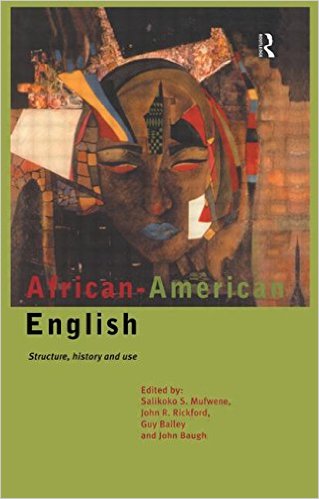 |
|
African-American English: Structure, History and Use
Amazon.com description:
African-American English: Structure, History and Use provides a comprehensive survey of linguistic research into African-American English. The main linguistic features are covered, in particular the grammar, phonology and lexicon. Further chapters explore the sociological, political and educational issues connected with African-American English.
The editors are the leading experts in the field and along with other key figures, notably William Labov, Geneva Smitherman and Walt Wolfram, they provide an authoritative, diverse guide to this topical subject area. Drawing on many contemporary references: the Oakland School controversy, the rap of Ice-T, the contributors reflect the state of current scholarship on African-American English, and actively dispel many misconceptions, address new questions and explore new approaches.
The book is designed to serve as a text for the increasing number of courses on African-American English and as a convenient reference for students of linguistics, black studies and anthropology at both undergraduate and postgraduate level.
|
|
|
| |
| |
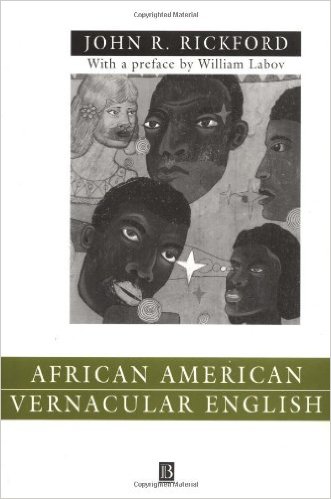 |
|
African American Vernacular English
Amazon.com description:
In response to the flood of interest in African American Vernacular English (AAVE) following the recent controversy over "Ebonics," this book brings together sixteen essays on the subject by a leading expert in the field, one who has been researching and writing on it for a quarter of a century. |
|
|
| |
| |
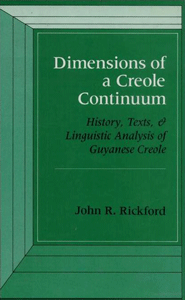
Dimensions of a Creole Continuum
John Rickford |
|
|
|
|
| |
| |
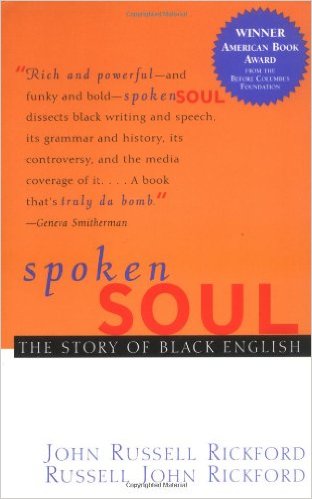 |
|
Spoken Soul
Amazon.com Review
In 1996, an America Online poll about Ebonics sparked more responses than did its survey on O.J. Simpson. And that's just a taste of the controversy and debate that Black English has provoked over the years. Called "Spoken Soul" by Claude Brown, author of Manchild in the Promised Land, the dialect of African Americans has been lauded, derided, questioned, and discussed for decades, but never so comprehensively and fairly as in this historic, sociologic, and linguistic overview and analysis by John Russell Rickford (the Martin Luther King Jr. Centennial Professor of Linguistics at Stanford University) and Russell John Rickford (a journalist, formerly of the Philadelphia Inquirer).
They discuss the attitudinal impact of socioeconomic factors, as well as the effect of generation and gender. They look at the place of black vernacular in literature and family, identity and culture, education and politics. And they track previous debates, from Paul Laurence Dunbar's considerations in the late 1800s to the black intelligentsia of the Harlem Renaissance to the issues raised by the civil rights movement of the 1960s to the recent Ebonics discourse.
Part 2, entitled "This Passion, This Skill, This Incredible Music," takes a close look at the richness of Spoken Soul, as recorded in literature (both black and white), from John Leacock's 1776 play The Fall of British Tyranny to DMX's rap lyrics of today. They look at the language of preachers and comedians, actors and singers, and scores of writers, and then they delve deeper, into the components of the living language, examining the vocabulary, pronunciation, grammar, and history of the black vernacular. And finally, the Rickfords discuss the role of Spoken Soul in terms of African American identity. The result? A thoughtful, erudite, and provocative narrative that lifts the discussion of Black English out of the knee-jerk negativity that arose from the Ebonics controversy of 1996 and into the loftier and more appropriate realms of linguistics, literature, and culture. --Stephanie Gold --
|
|
|
| |
| |
 |
|
Creole Genesis, Attitudes and Discourse: Studies Celebrating Charlene J. Sato
Amazon.com description:
This academic study begins by focusing on the genesis and development of pidgin languages and creoles. Further sections deal with attitudes to creole varieties, and with the related question of the place of such varieties in local schools. |
|
|
| |
| |
 |
|
Style and Sociolinguistic Variation
Amazon.com description:
Contributions to this work deal not only with grammatical gender but also with discursive procedures for constructing gender as a relevant social category in text and context. Attention is directed to European cultures which have not received extensive linguistic and discourse analysis, such as Austria, Spain, Turkey, Germany, Poland and Sweden. Questions of English grammatical gender are also dealt with. The studies argue that feminine gender is often staged in a way that leads to situative asymmetry to the advantage of men. They also suggest that the broader societal context of patriarchy does not determine all communicative encounters, but demands particular efforts from women and men to be subverted. |
|
|
| |
| |
 |
|
Language in the USA: Themes for the Twenty-first Century
Amazon.com description:
Contributions to this work deal not only with grammatical gender but also with discursive procedures for constructing gender as a relevant social category in text and context. Attention is directed to European cultures which have not received extensive linguistic and discourse analysis, such as Austria, Spain, Turkey, Germany, Poland and Sweden. Questions of English grammatical gender are also dealt with. The studies argue that feminine gender is often staged in a way that leads to situative asymmetry to the advantage of men. They also suggest that the broader societal context of patriarchy does not determine all communicative encounters, but demands particular efforts from women and men to be subverted. |
|
|
| |